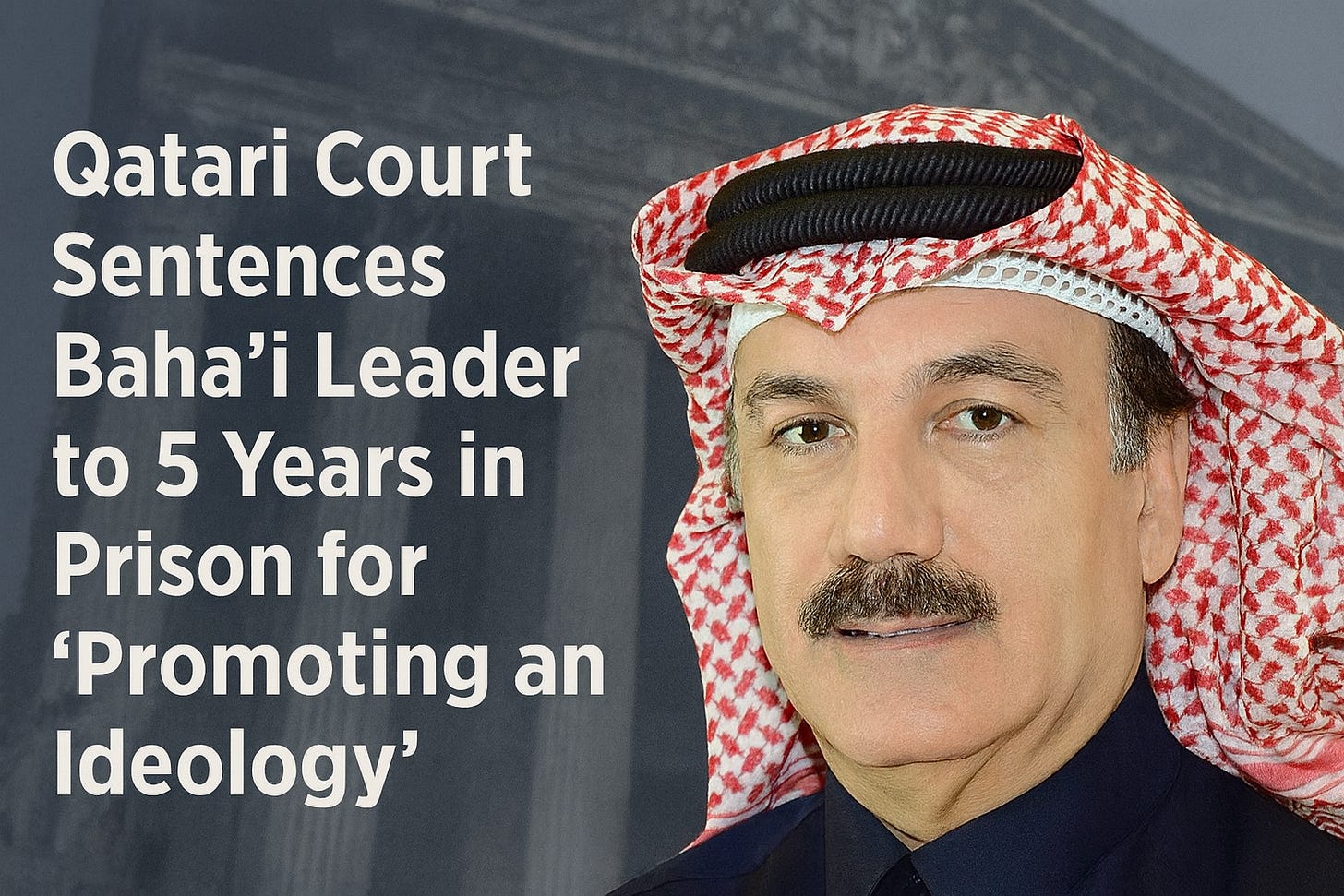Qatari Court Sentences Baha'i Leader to 5 Years in Prison for "Promoting an Ideology"
The sentencing of Baha’i leader Remy Rowhani marks a new escalation in the state’s crackdown on religious minorities, drawing rare condemnation from the Trump Administration
On August 13, a Qatari court sentenced Remy Rowhani, chairman of the National Spiritual Assembly of the Baha’is in Qatar, to five years in prison. The conviction was based on charges of promoting an ideology that “raises doubts about the fundamental principles and teachings of the Islamic religion." The verdict, a serious blow to religious freedom advocates, has drawn swift condemnation from international human rights organizations.
Rowhani’s conviction, based on social media posts that allegedly "promoted Baha'i values," represents a significant step from administrative harassment to judicial persecution. His previous arrests for fundraising for the community, a religious obligation for Baha'is, also demonstrate the Qatari government's continuous efforts to curtail the community's activities.
Commenting on the verdict, the Bahá'í International Community stated that “This oppressive ruling does not target [Remy] alone, but all Baha’is in Qatar.”
U.S. Condemns “Systematic Pattern” of Persecution
The United States Commission on International Religious Freedom (USCIRF) was quick to denounce the sentence, calling it part of a "broader and disturbing pattern of disparate treatment of the Baha'i minority in Qatar." In an official statement, the USCIRF officials noted the irony that Qatar's penal code, which punishes “insulting religion,” is being weaponized to suppress a peaceful religious minority.
“Proponents of blasphemy laws argue that such legislation is necessary to protect religious freedom. In practice, as shown in Mr. Rowhani’s case, blasphemy laws have empowered the Qatari government to use them to punish those who express minority viewpoints.” - Vicky Hartzler, USCIRF Chair
The Baha'i Faith
The Baha'i faith, which originated in 19th-century Persia (modern-day Iran), is a monotheistic religion that teaches the unity of all religions and the oneness of humanity. With approximately six million adherents worldwide, the Baha'i faith’s emphasis on a progressive revelation of religious truth, with its founder Baháʼu'lláh as the most recent messenger from God, is often viewed as a direct challenge to the finality of Muhammad's prophecy in Islam, a core reason for the persecution of Baha'is in many Muslim-majority countries. Its international headquarters are located in Haifa, Israel.

The Baha'i Community in Qatar
The case against Rowhani is seen by many as a troubling escalation of long-standing discrimination against the Baha'i community in Qatar. Though small, with an estimated 200-300 members, the Baha'i community in Qatar has existed since the 1940s and has faced a range of systemic restrictions.
According to Human Rights Watch and reports by United Nations special rapporteurs, Qatari authorities have subjected Baha’is to deportations, blacklisting, termination of employment, denial of required certificates for employment, and refusal to recognize marriage certificates issued by Baha’i institutions.
This verdict against Remy Rowhani not only infringes on his personal rights but also signals a wider move to marginalize the Baha'i community.




The only place in the whole of the middle East where the Baha"I are safe is here in Israel.
And the irony is, Qatar are the ones attempting to dictate how everyone else's lives run in all other countries through buying up control of those countries, including attempting to control and push the war in Israel. So if anyone is controlling an ideology it's Qatar itself, yet they punish anyone else they can to get what Qatar wants and then have the audasidy to imprison someone else, who has different opinions, to make themselves appear to not look like they're the ideology, without any consideration to the fact, people have already seen right through them. You can't make this stuff up.